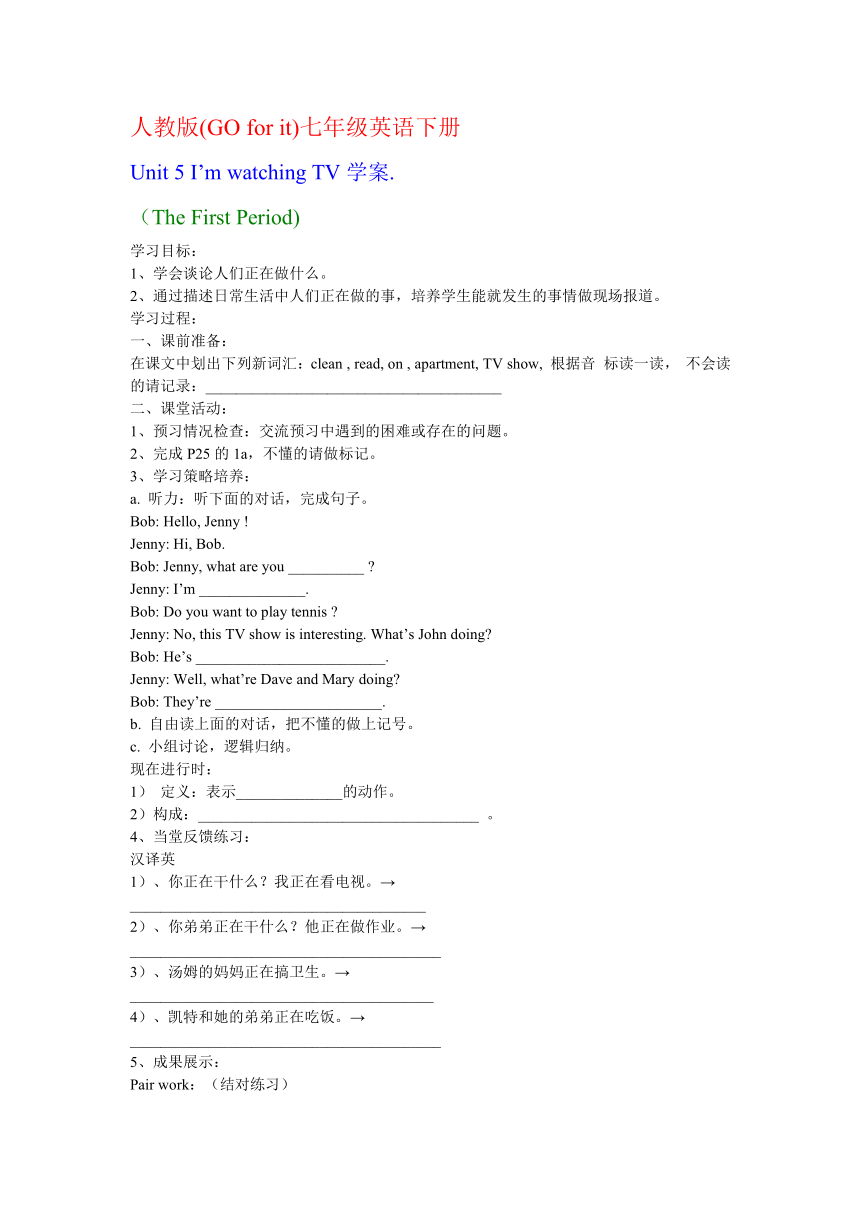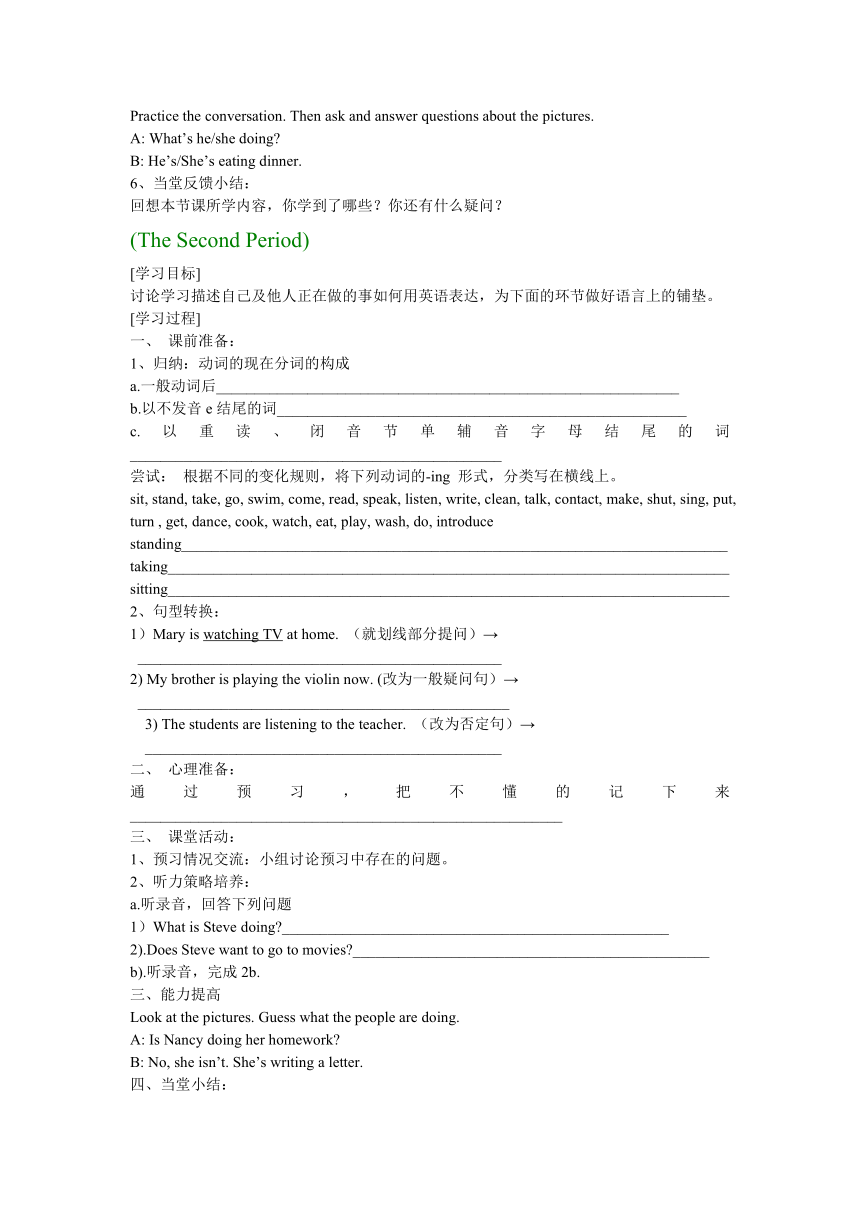Unit 5 I’m watching TV.(5课时学案)
文档属性
| 名称 | Unit 5 I’m watching TV.(5课时学案) |  | |
| 格式 | zip | ||
| 文件大小 | 11.6KB | ||
| 资源类型 | 教案 | ||
| 版本资源 | 人教新目标(Go for it)版 | ||
| 科目 | 英语 | ||
| 更新时间 | 2012-03-09 21:44:36 | ||
图片预览


文档简介
人教版(GO for it)七年级英语下册
Unit 5 I’m watching TV学案.
(The First Period)
学习目标:
1、学会谈论人们正在做什么。
2、通过描述日常生活中人们正在做的事,培养学生能就发生的事情做现场报道。
学习过程:
一、课前准备:
在课文中划出下列新词汇:clean , read, on , apartment, TV show, 根据音 标读一读, 不会读的请记录:_______________________________________
二、课堂活动:
1、预习情况检查:交流预习中遇到的困难或存在的问题。
2、完成P25的1a,不懂的请做标记。
3、学习策略培养:
a. 听力:听下面的对话,完成句子。
Bob: Hello, Jenny !
Jenny: Hi, Bob.
Bob: Jenny, what are you __________
Jenny: I’m ______________.
Bob: Do you want to play tennis
Jenny: No, this TV show is interesting. What’s John doing
Bob: He’s _________________________.
Jenny: Well, what’re Dave and Mary doing
Bob: They’re ______________________.
b. 自由读上面的对话,把不懂的做上记号。
c. 小组讨论,逻辑归纳。
现在进行时:
1) 定义:表示______________的动作。
2)构成:_____________________________________ 。
4、当堂反馈练习:
汉译英
1)、你正在干什么?我正在看电视。→
_______________________________________
2)、你弟弟正在干什么?他正在做作业。→
_________________________________________
3)、汤姆的妈妈正在搞卫生。→
________________________________________
4)、凯特和她的弟弟正在吃饭。→
_________________________________________
5、成果展示:
Pair work:(结对练习)
Practice the conversation. Then ask and answer questions about the pictures.
A: What’s he/she doing
B: He’s/She’s eating dinner.
6、当堂反馈小结:
回想本节课所学内容,你学到了哪些?你还有什么疑问?
(The Second Period)
[学习目标]
讨论学习描述自己及他人正在做的事如何用英语表达,为下面的环节做好语言上的铺垫。
[学习过程]
一、 课前准备:
1、归纳:动词的现在分词的构成
a.一般动词后_____________________________________________________________
b.以不发音e结尾的词______________________________________________________
c.以重读、闭音节单辅音字母结尾的词_________________________________________________
尝试: 根据不同的变化规则,将下列动词的-ing 形式,分类写在横线上。
sit, stand, take, go, swim, come, read, speak, listen, write, clean, talk, contact, make, shut, sing, put, turn , get, dance, cook, watch, eat, play, wash, do, introduce
standing________________________________________________________________________
taking__________________________________________________________________________
sitting__________________________________________________________________________
2、句型转换:
1)Mary is watching TV at home. (就划线部分提问)→
________________________________________________
2) My brother is playing the violin now. (改为一般疑问句)→
_________________________________________________
3) The students are listening to the teacher. (改为否定句)→
_______________________________________________
二、 心理准备:
通过预习,把不懂的记下来_________________________________________________________
三、 课堂活动:
1、预习情况交流:小组讨论预习中存在的问题。
2、听力策略培养:
a.听录音,回答下列问题
1)What is Steve doing ___________________________________________________
2).Does Steve want to go to movies _______________________________________________
b).听录音,完成2b.
三、能力提高
Look at the pictures. Guess what the people are doing.
A: Is Nancy doing her homework
B: No, she isn’t. She’s writing a letter.
四、当堂小结:
(The Third Period)
[学习目标]
在学会提问What are you /is he doing 的基础上,扩展到学会对比一般现在时When do you to go to the movie
[学习过程]
一、课前准备:
1、找出下列新单词,sure,wait,wait for, 根据音标读一读,不会读的请记一来。
2、翻译下列词组
1)做作业______________2、看电视_______________ 3、读书______________
4、去看电影___________ 5、等待 ________________ 6、谈论____________
7、写信_______________ 8、与某人交谈_______________ 9、在游泳池游泳__________
10、看报纸____________ 11、打篮球__________________ 12、照相________________
二、、心理准备:
通过预习,把不懂的记下来_________________________________________________________
三、课堂活动:
(一)、预习情况交流:小组讨论预习中存在的问题。
(二)、学习策略培养:完成3a
(三)、能力提高
完成P27 part4
(四)、巩固练习
1、用进行时填空
1). Look! They _________(eat) dinner.
2). ------What’s your brother doing
-------He _______ (play) computer games.
3). -------What are you doing
-------_______ you ______ (watch) TV
-------No, I_______ (read) a magazine.
4). -------Where is Tom’s sister
-------She ________(talk) to her friends on the phone.
5). Listen! Andrew________(sing) in his room.
6). It’s 6:30 in the morning. Mr Wu__________(have) breakfast.
7). Let’s go and see who_________(run) over there.
8). Be quiet! The teachers_________(have) a meeting.
(五)、总结反思
通过本课学习,你还有哪些不明白?
(The Fourth Period)
[学习目标]
能运用现在进行时做现场报道
[学习过程]
一、提前预习,勤于归纳
1、单词:1). shop_______2).people_______3). need________4). thanks for________5)at school_________
6). watch TV________
2、完成P28 1a
二、、心理准备:
通过预习,把不懂的记下_________________________________________________________
三、课堂活动:
(一)、预习情况交流:小组讨论预习中存在的问题。
(二)、学习策略培养
1、语言能力培养
Look at the pictures in 1a.Then ask answer questions.
A:Where is he swimming
B:At the pool.
2、听力能力培养
Listen and fill in the blank.
Name Place Activity
Tina mail
Mike
Lisa
3、学习成果展示
Use the information in the chart to make a conversation.
A: Hello! Is Tina there
B: No, she isn’t. She’s -----.
1____________________________________
2.________________________ _____________________________________ ___________________________________
3. _____________________________________
______________________________________
(三)巩固练习
1、句型转换
1). Emma often draws pictures in the evening. (用now)→ _____________________________________________________
2). My brother is doing his homework.(改为一般疑问句)→____________________________________________
3). They are playing computer games.(改为否定句)→
________________________________________________
4). My mother is watching TV.(就画线部分提问)→
__________________________________________________
5). Is she writing a letter to her uncle (作否定回答)→
_____________________________________________________
(四)总结反思
(The Fifth Period)
[学习目标]
进一步提高现在进行时运用能力
[学习过程]
一、课前准备:
1、划出新单词,根据音标读一读。
2、快速浏览P29 3a课文,Underline the activties and circle the places.
通过预习,你们还有哪些不懂的地方?请记录___________________________________________
3、准备些图片,照片。
三、课堂活动:
(一)、预习情况交流:小组讨论预习中存在的问题。
(二)、学习策略培养
1、阅读能力培养
1)完成3a
2)语言知识归纳,你认为本课中哪些比较有用的短语和句子?
重点词汇:
重点句子:
3)、学习成果展示:流利地朗读课文,看谁 读得好!
2、完成P29 3b
3、能力提高练习
Group work
Tell the group about your photos.
(三)巩固练习
根据提示语完成汉译英语
1)、他们正在用电话交谈。(on the phon)→
________________________________________
2)、这个电视节目很有趣。(TV show)→
______________________________________
3)、你在等谁?(wait for)→
__________________________________________
4)、她每天都做家庭作业。(do homework)→
________________________________________
5)、老师们正在谈论什么?(talk about)→
_________________________________________
(四)Writing. 用以下词汇,展开丰富的想象,写一篇不少于50个词的短文。
要求:1、语句表达符合英语习惯。
2、所写短文要有一定的情理性。
Words;computer,cup,basketball,grandpa
____________________________________________________________________________________________________________________________________________________________________________________________________________________________________________________________________________________
(五)总结反思:
Unit 5 I’m watching TV学案.
(The First Period)
学习目标:
1、学会谈论人们正在做什么。
2、通过描述日常生活中人们正在做的事,培养学生能就发生的事情做现场报道。
学习过程:
一、课前准备:
在课文中划出下列新词汇:clean , read, on , apartment, TV show, 根据音 标读一读, 不会读的请记录:_______________________________________
二、课堂活动:
1、预习情况检查:交流预习中遇到的困难或存在的问题。
2、完成P25的1a,不懂的请做标记。
3、学习策略培养:
a. 听力:听下面的对话,完成句子。
Bob: Hello, Jenny !
Jenny: Hi, Bob.
Bob: Jenny, what are you __________
Jenny: I’m ______________.
Bob: Do you want to play tennis
Jenny: No, this TV show is interesting. What’s John doing
Bob: He’s _________________________.
Jenny: Well, what’re Dave and Mary doing
Bob: They’re ______________________.
b. 自由读上面的对话,把不懂的做上记号。
c. 小组讨论,逻辑归纳。
现在进行时:
1) 定义:表示______________的动作。
2)构成:_____________________________________ 。
4、当堂反馈练习:
汉译英
1)、你正在干什么?我正在看电视。→
_______________________________________
2)、你弟弟正在干什么?他正在做作业。→
_________________________________________
3)、汤姆的妈妈正在搞卫生。→
________________________________________
4)、凯特和她的弟弟正在吃饭。→
_________________________________________
5、成果展示:
Pair work:(结对练习)
Practice the conversation. Then ask and answer questions about the pictures.
A: What’s he/she doing
B: He’s/She’s eating dinner.
6、当堂反馈小结:
回想本节课所学内容,你学到了哪些?你还有什么疑问?
(The Second Period)
[学习目标]
讨论学习描述自己及他人正在做的事如何用英语表达,为下面的环节做好语言上的铺垫。
[学习过程]
一、 课前准备:
1、归纳:动词的现在分词的构成
a.一般动词后_____________________________________________________________
b.以不发音e结尾的词______________________________________________________
c.以重读、闭音节单辅音字母结尾的词_________________________________________________
尝试: 根据不同的变化规则,将下列动词的-ing 形式,分类写在横线上。
sit, stand, take, go, swim, come, read, speak, listen, write, clean, talk, contact, make, shut, sing, put, turn , get, dance, cook, watch, eat, play, wash, do, introduce
standing________________________________________________________________________
taking__________________________________________________________________________
sitting__________________________________________________________________________
2、句型转换:
1)Mary is watching TV at home. (就划线部分提问)→
________________________________________________
2) My brother is playing the violin now. (改为一般疑问句)→
_________________________________________________
3) The students are listening to the teacher. (改为否定句)→
_______________________________________________
二、 心理准备:
通过预习,把不懂的记下来_________________________________________________________
三、 课堂活动:
1、预习情况交流:小组讨论预习中存在的问题。
2、听力策略培养:
a.听录音,回答下列问题
1)What is Steve doing ___________________________________________________
2).Does Steve want to go to movies _______________________________________________
b).听录音,完成2b.
三、能力提高
Look at the pictures. Guess what the people are doing.
A: Is Nancy doing her homework
B: No, she isn’t. She’s writing a letter.
四、当堂小结:
(The Third Period)
[学习目标]
在学会提问What are you /is he doing 的基础上,扩展到学会对比一般现在时When do you to go to the movie
[学习过程]
一、课前准备:
1、找出下列新单词,sure,wait,wait for, 根据音标读一读,不会读的请记一来。
2、翻译下列词组
1)做作业______________2、看电视_______________ 3、读书______________
4、去看电影___________ 5、等待 ________________ 6、谈论____________
7、写信_______________ 8、与某人交谈_______________ 9、在游泳池游泳__________
10、看报纸____________ 11、打篮球__________________ 12、照相________________
二、、心理准备:
通过预习,把不懂的记下来_________________________________________________________
三、课堂活动:
(一)、预习情况交流:小组讨论预习中存在的问题。
(二)、学习策略培养:完成3a
(三)、能力提高
完成P27 part4
(四)、巩固练习
1、用进行时填空
1). Look! They _________(eat) dinner.
2). ------What’s your brother doing
-------He _______ (play) computer games.
3). -------What are you doing
-------_______ you ______ (watch) TV
-------No, I_______ (read) a magazine.
4). -------Where is Tom’s sister
-------She ________(talk) to her friends on the phone.
5). Listen! Andrew________(sing) in his room.
6). It’s 6:30 in the morning. Mr Wu__________(have) breakfast.
7). Let’s go and see who_________(run) over there.
8). Be quiet! The teachers_________(have) a meeting.
(五)、总结反思
通过本课学习,你还有哪些不明白?
(The Fourth Period)
[学习目标]
能运用现在进行时做现场报道
[学习过程]
一、提前预习,勤于归纳
1、单词:1). shop_______2).people_______3). need________4). thanks for________5)at school_________
6). watch TV________
2、完成P28 1a
二、、心理准备:
通过预习,把不懂的记下_________________________________________________________
三、课堂活动:
(一)、预习情况交流:小组讨论预习中存在的问题。
(二)、学习策略培养
1、语言能力培养
Look at the pictures in 1a.Then ask answer questions.
A:Where is he swimming
B:At the pool.
2、听力能力培养
Listen and fill in the blank.
Name Place Activity
Tina mail
Mike
Lisa
3、学习成果展示
Use the information in the chart to make a conversation.
A: Hello! Is Tina there
B: No, she isn’t. She’s -----.
1____________________________________
2.________________________ _____________________________________ ___________________________________
3. _____________________________________
______________________________________
(三)巩固练习
1、句型转换
1). Emma often draws pictures in the evening. (用now)→ _____________________________________________________
2). My brother is doing his homework.(改为一般疑问句)→____________________________________________
3). They are playing computer games.(改为否定句)→
________________________________________________
4). My mother is watching TV.(就画线部分提问)→
__________________________________________________
5). Is she writing a letter to her uncle (作否定回答)→
_____________________________________________________
(四)总结反思
(The Fifth Period)
[学习目标]
进一步提高现在进行时运用能力
[学习过程]
一、课前准备:
1、划出新单词,根据音标读一读。
2、快速浏览P29 3a课文,Underline the activties and circle the places.
通过预习,你们还有哪些不懂的地方?请记录___________________________________________
3、准备些图片,照片。
三、课堂活动:
(一)、预习情况交流:小组讨论预习中存在的问题。
(二)、学习策略培养
1、阅读能力培养
1)完成3a
2)语言知识归纳,你认为本课中哪些比较有用的短语和句子?
重点词汇:
重点句子:
3)、学习成果展示:流利地朗读课文,看谁 读得好!
2、完成P29 3b
3、能力提高练习
Group work
Tell the group about your photos.
(三)巩固练习
根据提示语完成汉译英语
1)、他们正在用电话交谈。(on the phon)→
________________________________________
2)、这个电视节目很有趣。(TV show)→
______________________________________
3)、你在等谁?(wait for)→
__________________________________________
4)、她每天都做家庭作业。(do homework)→
________________________________________
5)、老师们正在谈论什么?(talk about)→
_________________________________________
(四)Writing. 用以下词汇,展开丰富的想象,写一篇不少于50个词的短文。
要求:1、语句表达符合英语习惯。
2、所写短文要有一定的情理性。
Words;computer,cup,basketball,grandpa
____________________________________________________________________________________________________________________________________________________________________________________________________________________________________________________________________________________
(五)总结反思:
同课章节目录
- Unit 1 Can you play the guitar?
- Section A
- Section B
- Unit 2 What time do you go to school?
- Section A
- Section B
- Unit 3 How do you get to school?
- Section A
- Section B
- Unit 4 Don't eat in class.
- Section A
- Section B
- Unit 5 Why do you like pandas?
- Section A
- Section B
- Unit 6 I'm watching TV.
- Section A
- Section B
- Review of Units 1-6
- Unit 7 It's raining!
- Section A
- Section B
- Unit 8 Is there a post office near here?
- Section A
- Section B
- Unit 9 What does he look like?
- Section A
- Section B
- Unit 10 I'd like some noodles.
- Section A
- Section B
- Unit 11 How was your school trip?
- Section A
- Section B
- Unit 12 What did you do last weekend?
- Section A
- Section B
